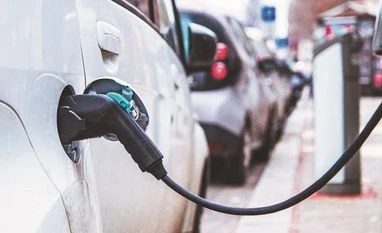In the midst of frequent incidents of e-vehicles catching fire, the NITI Aayog on Thursday released the much-awaited draft policy on battery-swapping for electric two- and three-wheelers.
Its highlights are lowering prices of electric vehicles (EVs); accelerating the adoption of battery-powered vehicles; addressing anomalies in goods and services tax (GST) rates with regard to batteries, EV supply equipment, and e-vehicles; and enhancing the safety and performance of advanced cell chemistry.
This comes nearly three months after the proposed policy found a mention in Union Finance Minister Nirmala Sitharaman’s Budget speech. The policy is aimed at providing an impetus to India’s transition to green mobility, she had said.
The think tank has invited stakeholder feedback on the draft policy. The last date for comment is June 5.
The policy proposes a staggered roll-out in two phases. The first phase includes developing an ecosystem for battery as a service (BaaS) in metropolitan cities with a population of more than 4 million. The second phase includes developing battery-swapping networks in state capitals and major cities with over 500,000 people.
The NITI Aayog has suggested the incentives for vehicles with fixed batteries be extended to swappable-battery vehicles. The think tank also pushed for fixed-asset concessions for swapping stations.
It suggested the GST Council reduce the differentials between the rates on lithium-ion batteries and electric vehicle supply equipment (EVSE), which are 18 per cent and 5 per cent, respectively.
Industry experts and EV makers said the draft policy was inclusive and addressed most of the critical areas.
According to Sohinder Gill, director general at the Society of Manufacturers of Electric Vehicles (SMEV), the life of the battery and the safety aspects can be better handled in a swap station than inside the e-scooter because the swap station can deploy pre- and post-charge cooling and regulated charging better.
The policy draft is inclusive and promotes interoperability and open architecture. However, the concept of interoperability using the standardised battery needs “to be debated in greater detail as there could be technical challenges as well as the revenue sharing model will have to be worked out carefully to assure ROI to the investments done by the companies,” said Gill.
The draft has been released amid incidents of almost a dozen e-scooters catching fire over the past seven months. The guidelines on battery data sharing, which are part of the draft policy, will provide room for safety and the performance improvement of advanced cell chemistry.
Harshvardhan Sharma, head (auto retail consulting practice), Nomura Research, said the increase in the tax benefits would be “a shot in the arm”.
“That’s more power to people. Also the UIN (unique identification number) is a great step to improve traceability and recycling in parity with global initiatives such as battery passport programmes,” said Sharma.
The policy has laid down safety measures for battery-swapping operators.
“To ensure a high level of protection at the electrical interface, a robust/rigorous testing protocol shall be adopted to avoid any dielectric breakdown, arc phenomenon, or any unwanted temperature rise at the electrical interface. BMS (battery management system) of the battery must be self-certified and open for testing to check its compatibility with various systems, and capability to meet safety requirements,” the policy document said.
The Ministry of Road Transport and Highways has constituted an expert committee to look into battery safety.
“We are aligned with the government on the need to establish standards to promote interoperability in the swapping infrastructure,” said Vivekananda Hallekere, chief executive officer and co-founder, Bounce.
He, however, added the government should form these standards and policies only after testing them and not limiting the assessment to lab tests.
“We urge the government to kindly consider the above points before the policy and standards for battery swapping is formalised,” added Hallekere.
To read the full story, Subscribe Now at just Rs 249 a month
Already a subscriber? Log in
Subscribe To BS Premium
₹249
Renews automatically
₹1699₹1999
Opt for auto renewal and save Rs. 300 Renews automatically
₹1999
What you get on BS Premium?
-
Unlock 30+ premium stories daily hand-picked by our editors, across devices on browser and app.
-
Pick your 5 favourite companies, get a daily email with all news updates on them.
Full access to our intuitive epaper - clip, save, share articles from any device; newspaper archives from 2006.
Preferential invites to Business Standard events.
Curated newsletters on markets, personal finance, policy & politics, start-ups, technology, and more.
Need More Information - write to us at assist@bsmail.in
)